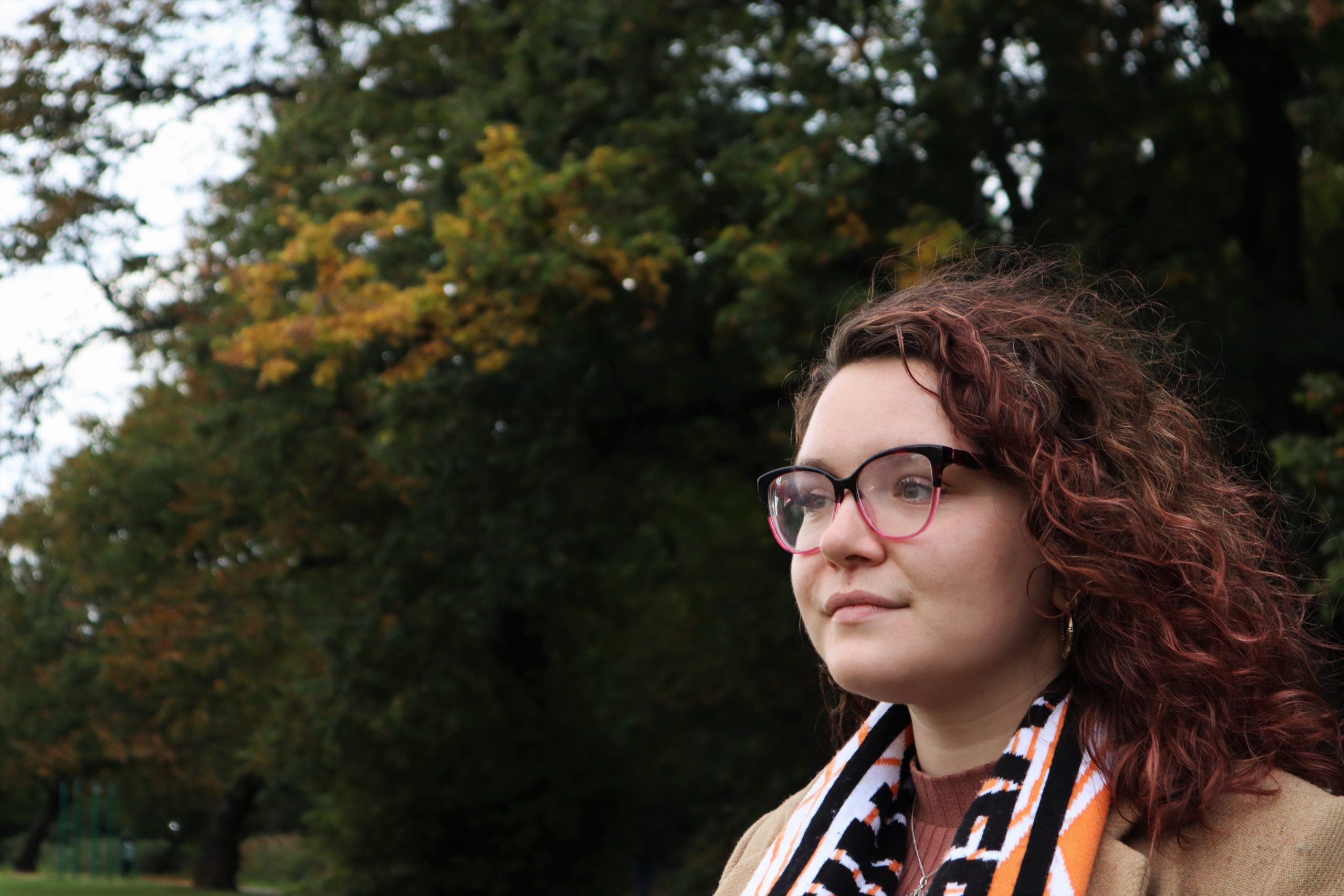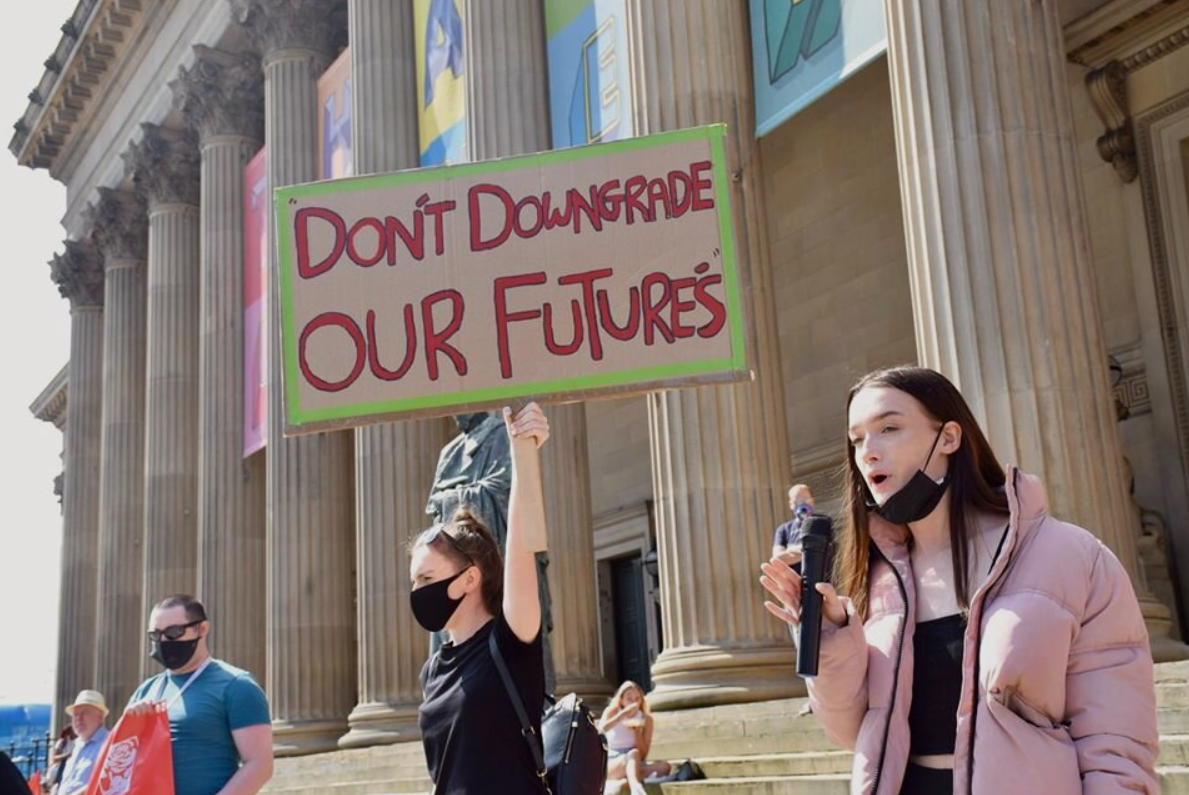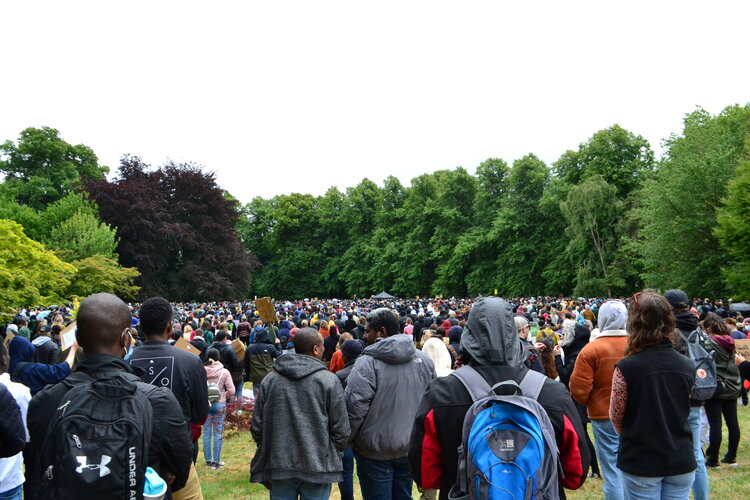
“It’s Just This Culture of Not Believing Women”: Gendered Violence, Sexual Assault & Navigating a Mysoginistic System
After the brutal murder of Sarah Everard by a serving Metropolitan Police officer earlier this year, focus has shifted to gender violence, the deplorable rape prosecution figures and a rampant and deep-rooted culture of misogyny in the police and justice system. Faith Clark speaks to Tess Marshall, an activist and community organiser in Cardiff, about her experience of sexual assault, the impact on her mental health, and the obstacles she faced to seek healthcare and justice – the latter of which she has never received. This article mentions gender violence such as sexual assault, as well as mental health conditions, suicide and self-harm
Image: Tess, by Faith Clark
Whether it’s taking the better-lit route home, or walking with keys between our fingers, as women we live our lives attempting to minimise our chances of being preyed upon. Sexual assault is something every woman fears. It is, as Cardiff-based activist and community organiser Tess Marshall puts it, the “worst thing that you can imagine happening to you.”
The Sarah Everard case has once again brought to the fore conversations around gender violence. Sarah’s murder was made all the more chilling by the fact that her attacker, Wayne Couzens, was a serving Metropolitan Police officer. He exerted his power as both a cop and a man to stage a false arrest under which he kidnapped and brutally murdered her.
This is not the only case to rattle women this year. In August, Jake Davison shot dead five people in Plymouth. Prior to the attack, he had been active on social media platforms discussing the “incel” movement – young men describing themselves as “involuntarily celibate” and blaming women for their sexual failings.
In September, London teacher Sabina Nessa was killed on a “five-minute” walk to meet a friend at a pub. According to a data from the Femicide Census – an organisation which collects information on male violence against women – in the UK, 1,425 women were killed by men between 2009-2018.
Rape “breaks something inside of you”
Tess has been involved with organising around women’s issues since joining the Uprising Leadership programme in 2018, which trains young people in various campaigning skills. During her time on the progamme, she chose to focus her project on violence against women and other women’s issues, telling me that, “as a woman, it’s not something that you can ignore”.
When I spoke to Tess earlier this year, an investigation by UN Women UK had just been released, which found that 97% of women aged 18-24 have been sexually harassed, with a further 96% choosing to not report incidents because of the belief that it would not change anything.
For Tess, the reality of gender violence hit home in more than one way. While running various workshops focusing on trauma experienced by women who had been victims of abuse and assault, Tess was raped while on a night out with a group of friends and acquaintances.
“The fact that you don’t have, like, bodily autonomy in that situation, it just… breaks something inside of you,” she told me over a Zoom call earlier this year.
Continuing her work with Uprising, Tess was able to find support in the workshops and art sessions she was a part of organising, though she recognised that she needed specialist care alongside this.
“Those things, even though they are useful, they can’t account for posttraumatic stress disorder, they can’t account for depression, or like suicidal ideation or self harm. And those are the things that women experience after being sexually assaulted – after being raped.”
Tess went to the police around seven days following the attack. She didn’t report the incident straight away because she felt like the police “wouldn’t take it seriously” – something which has been echoed by many other victims of sexual assault and harrassment.
But after seeing her GP and trying to get emergency support with Cardiff’s Sexual Assault Referral Centre (SARC) ‘Ynys Saff’ – or ‘Safe Island’ in English – she was told she couldn’t access the service until she reported the incident to the police, and as her mental health deteriorated, Tess realised she had no option but to do so.
“When I went to the police, they said, ‘we believe you. We believe that this has happened to you’ but they never arrested the guy,” recalls Tess. “Instead, they told me they invited him in [for] an interview – which I later found out is just a way for them to save money. Because if they have to arrest someone, they have to do like a bunch of paperwork, and it costs money. And so by inviting someone in, you don’t have to do that.”
“You have so many levels of structural obstruction”
The police investigated the case for around 6 weeks Tess tells me, but there were more obstacles along the way. The person whose house the incident took place in was refusing to cooperate with the police.
“You have so many levels of structural obstruction to you not only receiving health care, but receiving justice, and any kind of accountability from anyone,” Tess adds.
When the police investigation came to a close, so did Tess’s access to vital post-sexual assault services, and she was instead filtered into the regular mental health system to seek treatment for depression, PTSD and self-harm. She recalls that in the period following the incident, the waiting list was around 10 months for an emergency appointment, and two years for counselling.
While waiting for a mental health referral, the impact of the incident on her mental health resulted in Tess having to give up her job. “I couldn’t focus, I couldn’t work… And so I decided to leave my job working in the cafe because [I was] trying to serve people and be polite, you know, and be normal, [but] your whole world, your body just feels different.”
Covid-19 has inevitably made mental health waiting lists longer, with more people experiencing mental health issues as a result of the pandemic, and others finding existing conditions exacerbated. The situation for seeking “justice” is even bleaker. Rape charities have recently spoken out about how it can take years for cases to get to court.
One woman recently told BBC Wales that her experience of the justice system was so bad it was “like the abuse has continued”. The Crown Prosecution Service (CPS) decided not to prosecute her case despite her partner beating her to the extent that she suffered broken bones, abusing her emotionally and controlling her finances.
According to Tess, the odds are continually stacked against women – whether they’re seeking justice or trying to access healthcare and support.
“This has been exacerbated by austerity,” she adds. “There’s no question that austerity has impacted the way that we access justice in this country, and also the way we access healthcare, and especially mental health care and health care for women.”
A culture of not believing women
Rape convictions are at a record low in England and Wales, with prosecutions and convictions having more than halved in three years while rape cases are increasing. Ministers have partly blamed budget cuts and the disbanding of specialist rape units in police forces, but there’s also been concerns over the standards of evidence required to get a case to court.
In our conversation, Tess also points to the fact that most solicitors, barristers, judges and police officers are men, which contributes to what she describes as a “culture of not wanting to believe that other men are committing violence against women”. As well as this, there’s a lack of understanding around the consequences of sexual violence, and the knock-on impacts this can have on a person’s mental health.
She also points out the elements of sexism and mysoginy that are rampant in rape trials. “I feel very sexually empowered a lot of the time… if I’d had the opportunity to go to court, I would have had that used against me,” Tess says adamantly. “I would have had like, the fact that I was on Tinder used against me, the fact that maybe I was wearing a short skirt used against me… I’m fully convinced of that.”
Even for the minority of women whose cases do make it to court, they face challenges to prove they were raped due to “myths and misconceptions about what a rape victim should look and sound like” as the Guardian puts it. Cases are considered more “vulnerable” if alcohol is involved or if the victim has a mental health issue, for example.
In 2018 the Guardian revealed that prosecutors had been urged to take “a more risk-averse approach to prosecuting rape” in an attempt to improve figures by not pursuing “risky” or “vulnerable” cases that were harder to provide evidence for. Around this time, conviction rates increased from 57.6% to 68.5%, but the number of prosecutions plummeted.
The problem with the police
Since the murders of Sarah Everard and Sabina Nessa, police have issued some truly shocking advice, which once again puts the onus on women, and not on men, to change their behaviour.
Scotland Yard advised women to ask “very searching questions” if stopped by a lone officer and told women to ask to speak to an operator on a police radio to verify the answers. They also suggested women “seek assistance” by shouting to passers-by, waving down a bus or calling 999 – a seemingly tone-deaf approach when faced with the fact that Couzens was a serving officer, not somebody pretending to be one.
Couzens – who was nicknamed “the rapist” by colleagues – is also linked to two previous allegations of indecent exposure, and a Whatsapp group with five other police officers who are being investigated for gross misconduct. In the Whatsapp group the officers allegedly shared discriminatory messages and misogynistic content.
Earlier this week, a FoI request made by PA media’s Radar service revealed that at least 750 allegations of sexual misconduct were made against serving police officers across Britain between 2016 and 2020. According to separate FoI data, the Met – the UK’s largest police force – recorded 530 allegations of sexual offences against serving officers and staff members between 2016 and 2020, with just 47 claims resulting in a dismissal.
Ex-Met Ch Supt Parm Sandhu recently spoke out about the police’s “sexist and misogynistic” culture. Sandhu, who served in the Met for 30 years, said female officers “will not report their colleagues” due to “ the fear… that when you are calling for help… they’re not going to turn up and you’re going to get kicked in in the street.”
Sandhu added that women officers who are married to male police officers “won’t report domestic violence either because of the same sort of issues”.
Recent events and statistics have signalled a deeper issue of misogyny in the police and justice system, rather than it being a case of a “few bad apples.” This is something recently argued by Kate Wilson, the activist who was deceived into a long term sexual relationship with undercover cop Mark Kennedy, who infiltrated leftwing groups for seven years whilst working for the Metropolitan Police.
“This is just an ingrained thing”
For Tess, who studied International Law at university, the culture of misogyny in the police – and in wider society – is not something that can be solved by more female police officers and judges alone.
“I don’t even know how you begin to like, tackle… this culture of not believing women,” she says. “It’s just so ingrained. It doesn’t matter if you’re a feminist. It doesn’t matter if you’re, you know, a healthcare professional. It doesn’t matter if you’re a judge. This is just an ingrained thing.”
Since the Black Lives Matter movement gathered momentum in Wales last year, there’s been more discussions around the role of the police and arguments for defunding them.
Following the violent police break-up of a vigil for Sarah Everard in London in March, where images of police aggressively pressing women to the ground quickly spread, the “Kill the Bill” movement erupted. These protests not only took aim at misogyny among cops, but the question of state power and oppression more generally.
We’ve had the police for 200 years in this country, Tess points out, and they were originally established to protect ruling class interests and property – not people.
“If they [the police] were established to protect people, women would be at the top of their list” Tess argues, pointing out the well-known fact that men commit the majority of violent crimes, and, while generally speaking, men are more likely to also be victims of physical violence, women are far more likely to be victims of sexual, familial and domestic violence.
Defunding the police is something that could help women, she says, particularly when accessing vital post-sexual assault healthcare services is “really reliant on whether you go to the police.”
But the justice system cannot be neglected in this conversation, Tess adds. Funding for the courts so they can open and function more days a week, thus speeding up the caseload would be a start, and putting more money into legal aid – and increasing the threshold for legal aid – would be vital.
This would be with an end goal of “wholesale reform”, she argues, that would not only change the structure of the justice system, but what we consider to be justice – a nod towards more restorative and community-based approaches that would be focused on changing attitudes rather than just punishment.
With only surface-level changes suggested by the Tories and the Metropolitan Police, who seem to fail to understand the depth of this misogyny, Tess isn’t optimistic. “I can’t see a way forward for women in this society the way that we are…” she says. “I don’t think there is a way forward. In fact, it will probably just get worse. And soon we’ll see 98% of victims not having justice, until we get to 100%.”


